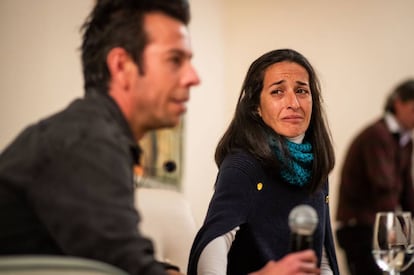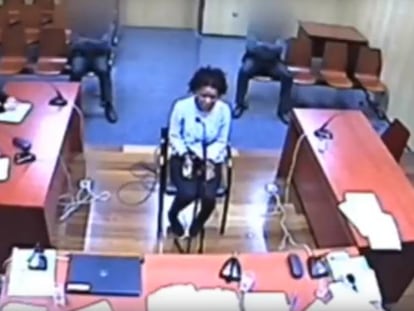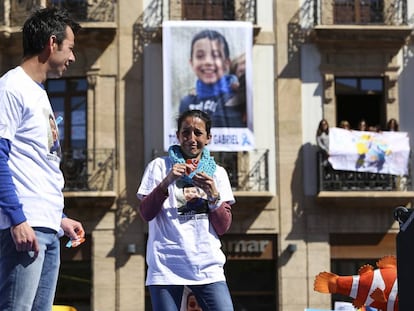Trial for murder of eight-year-old Gabriel Cruz begins in Almería
Seven women and two men will decide the fate of Ana Julia Quezada, the self-confessed killer of the child, who was the son of her boyfriend at the time of his death in 2018


The trial for the murder of an eight-year-old Spanish boy named Gabriel Cruz began on Monday morning at the provincial court of Almería in southern Spain.
Gabriel was killed in Las Hortichuelas in the southern Andalusian province on February 27, 2018. His father’s girlfriend at the time, Ana Julia Quezada, a 45-year-old native of Dominican Republic who moved to Spain in her early twenties, confessed to the murder after police caught her moving the eight-year-old’s body in the trunk of her car.
On March 11, Civil Guard officers watched Quezada take Gabriel’s corpse and load it into the trunk of her car
Dressed in white and wearing a dark jacket, Quezada arrived at court on Monday morning in handcuffs and with a serious expression on her face. At 10am, jury selection began, and 90 minutes later, seven men and two women had been chosen to try the defendant. A man and a woman will serve as alternate jurors.
The trial is scheduled to take place over nine sessions between September 9 and 19, and will determine the sentence that will be handed down to Quezada. Gabriel’s parents, Ángel Cruz and Patricia Ramírez, represented by the lawyer Francisco Torres, and the public prosecutor are calling for Quezada to face the maximum prison sentence: reviewable permanent imprisonment, which allows judges to convict criminals to life with a possibility of parole after a minimum fixed term in cases considered to be particularly heinous, such as assassinating a head of state, terrorist homicides, killing a minor under 16 years of age, and serial killings.
The public prosecutor also wants Quezada to be sentenced to an additional 10 years in prison for two crimes of inflicting psychological harm on Gabriel’s parents. Quezada’s defense lawyer, Esteban Hernández Thiel, is arguing that the crime falls in the category of reckless homicide, or at worst, intentional homicide.

Judge Alejandra Dodero has agreed to hold a closed-court session on Monday at the request of Torres and the public prosecutor. The session on September 16 will also be reserved solely for forensic experts. Quezada is set to give her testimony at the hearing on Monday, and on the second day of the trial, the parents of Gabriel will appear. A total of 17 witnesses, 22 expert witnesses and 25 experts have been called to appear at the provincial court.
In her opening court statement, Judge Dodero outlined the accusations facing Quezada. On February 27, 2018, Quezada is accused of surprising Gabriel as he was going to play with his cousins near his grandmother’s house in Nijar. She convinced him to get into her car with her so that they could go and “paint the house” on a family estate in nearby Rodalquilar, where Quezada and her partner, the boy’s father, Ángel Cruz, were renovating a property. Once there, she grabbed the “innocent and trusting boy” and “beat him violently and repeatedly, and covered his nose and mouth with her hands until he died from asphyxiation.”
Quezada then dug a grave with a spade that she had brought to the property days earlier and dumped Gabriel’s body inside. His left arm did not fit and she tried to cut it off with a hatchet, but only managed to break the bones.
Quezada’s defense lawyer is arguing that the crime falls in the category of reckless homicide
According to Quezada, she acted in self-defense. The self-confessed killer claims the eight-year-old got angry with her and attacked her with a hatchet. She hit him with the blunt part of the tool, leaving him unconscious. In a state of panic, she then strangled him with her hands, stripping him of his clothes and burying the body.
According to the court statement, Quezada pretended to be “grief-stricken” and at other times showed “a clear attitude of falseness and pretense” throughout the search for Gabriel, who went missing for 12 days before his body was found. On March 3, she planted a shirt belonging to the boy in an effort to deflect attention.
On March 11, the Civil Guard officers on surveillance duty watched her take the corpse and load it into the trunk of her car. She was arrested as she drove back to Puebla de Vícar, 73 kilometers from the scene of the crime.
Media intrusion
There are two faces to this trial. On the one hand, there is what the media will cover based on the hearings and testimony of the 17 witnesses, 22 expert witnesses and 25 experts who have been called to appear at the provincial court. On the other hand, there are Gabriel’s parents, who are terrified by the idea of hearing the terrible details of the death of their only child. To address this concern, the parents have issued a document called the “Ethical Pact for Gabriel’s Smile,” which asks the media not to leak unpublished information from the trial and to be “tactful” in their coverage.
English version by Melissa Kitson.
Tu suscripción se está usando en otro dispositivo
¿Quieres añadir otro usuario a tu suscripción?
Si continúas leyendo en este dispositivo, no se podrá leer en el otro.
FlechaTu suscripción se está usando en otro dispositivo y solo puedes acceder a EL PAÍS desde un dispositivo a la vez.
Si quieres compartir tu cuenta, cambia tu suscripción a la modalidad Premium, así podrás añadir otro usuario. Cada uno accederá con su propia cuenta de email, lo que os permitirá personalizar vuestra experiencia en EL PAÍS.
En el caso de no saber quién está usando tu cuenta, te recomendamos cambiar tu contraseña aquí.
Si decides continuar compartiendo tu cuenta, este mensaje se mostrará en tu dispositivo y en el de la otra persona que está usando tu cuenta de forma indefinida, afectando a tu experiencia de lectura. Puedes consultar aquí los términos y condiciones de la suscripción digital.









































